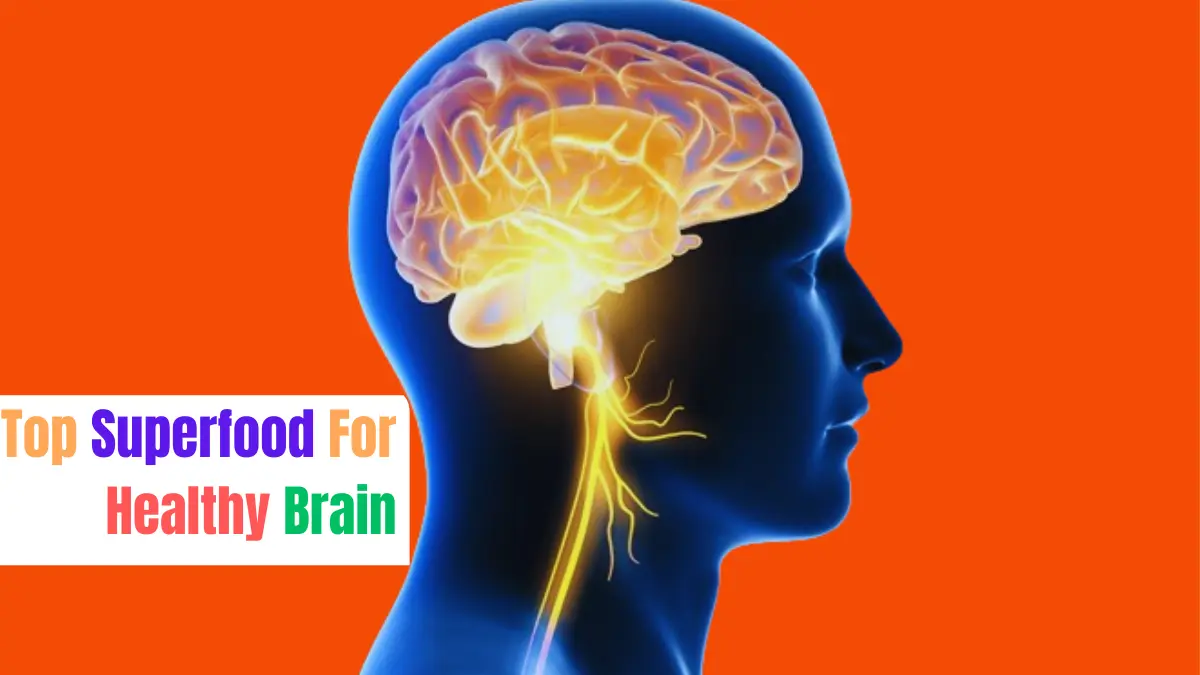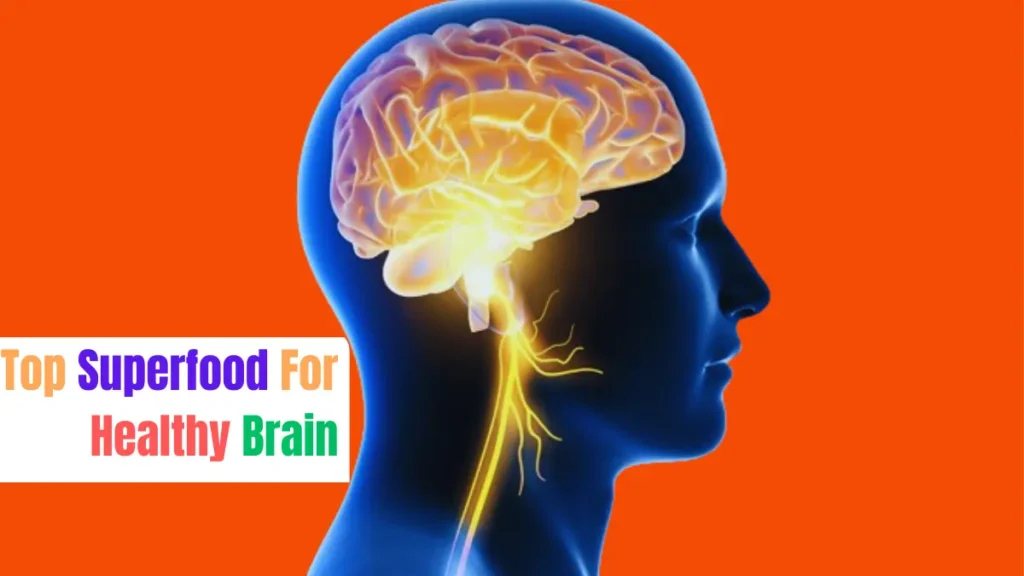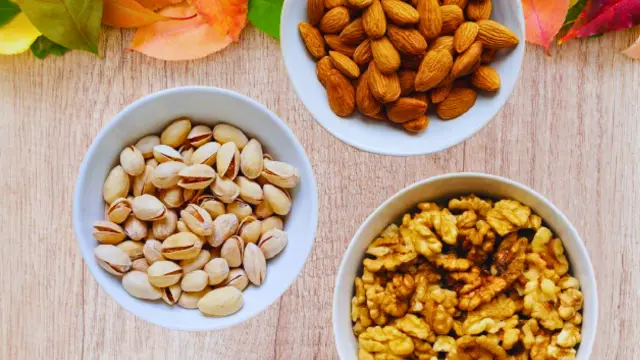Top 5 Best Superfoods For a Healthy Brain

The brain is the most important part of our body and our all-to-day functions depend on how our brain functions. In our busy lives, it’s necessary to keep our brains healthy. In this article we will see some important superfoods that we can use to keep our brain healthy, because what we eat daily is very important for our brain’s health.

Some foods, called superfoods, are especially good for our brains. These superfoods contain important nutrients and antioxidants that protect our brains and help them work well. Here we will see the top 5 superfoods that can make your brain healthier.
1. Nuts
Nuts are a fantastic food for brain health due to their rich nutritional profile. Nuts. Nuts have omega-3 and omega-6 fatty acids, important for brain function and growth. It contains antioxidants that protect brain cells from damage. Many nuts are rich in vitamin E, which helps protect brain cells. It also provides minerals like magnesium, zinc, and selenium, important for brain function and mood.

Best Nuts for Brain Health:-
Walnuts
- Benefits: High in omega-3 fatty acids, antioxidants, and vitamin E.
- Why: Omega-3s support brain cell structure, antioxidants protect against cell damage, and vitamin E supports cognitive function.
Almonds
- Benefits: Rich in vitamin E, magnesium, and healthy fats.
- Why: Vitamin E protects brain cells, and magnesium is crucial for nerve function.
Hazelnuts
- Benefits: High in vitamin E, healthy fats, and antioxidants.
- Why: Vitamin E and antioxidants help prevent cognitive decline.
Cashews
- Benefits: Good source of magnesium, zinc, and iron.
- Why: Magnesium supports brain health, zinc is important for memory, and iron helps with oxygen transport to the brain.
Pecans
- Benefits: High in antioxidants, vitamin E, and healthy fats.
- Why: Antioxidants protect brain cells, and vitamin E supports overall brain health.
How to Include Nuts in Your Diet ?
Snacking: Eat a handful of mixed nuts as a healthy snack.
Salads: Sprinkle chopped nuts on your salads for added crunch and nutrition.
Smoothies: Blend nuts into your smoothies for a creamy texture and extra nutrients.
Baking: Add nuts to your baked goods like muffins and breads.
Cooking: Use nut butters in sauces or as a spread on toast.
Read Also – Top 10 Super Foods to Improve Your Eyesight
2. Fatty Fish
Fatty fish is one of the best foods for brain health due to its high content of omega-3 fatty acids. Here’s how fatty fish benefits your brain and how you can include it in your diet:

Benefits for Brain Health
- Rich in Omega-3 Fatty Acids: Fatty fish like salmon, mackerel, and sardines are high in omega-3s, particularly EPA and DHA, which are essential for brain function and development.
- Improves Cognitive Function: Omega-3s help build brain and nerve cells, which are essential for learning and memory. They also support the structure of brain cell membranes.
- Reduces Inflammation: Omega-3s have anti-inflammatory properties that can help reduce brain inflammation, which is linked to cognitive decline and diseases like Alzheimer’s.
- Supports Mental Health: Regular consumption of omega-3s is associated with lower risks of depression and improved mood.
How to Include Fatty Fish in Your Diet ?
- Grilled or Baked Salmon: A simple and delicious way to enjoy fatty fish.
- Fish Tacos: Use grilled mackerel or salmon for a healthy twist on this popular dish.
- Salmon Salad: Add cooked salmon to your salad for a protein and omega-3 boost.
- Sardine Snacks: Enjoy sardines on whole-grain crackers for a nutritious snack.
- Fish Stew: Make a hearty fish stew with a mix of fatty fish like salmon and mackerel.
Read Also – Vegan 6 Side Effects You Need to Be Aware Of
3. Broccoli
Broccoli contains antioxidants and vitamin K. vitamin K is known for its role in forming sphingolipids, a type of fat that’s densely packed into brain cells. It also contains compounds with anti-inflammatory and antioxidant effects which may help protect the brain from damage.

How to Include Broccoli in Your Diet ?
Broccoli is a nutritious vegetable that can easily be added to your meals. Here are some simple ways to include broccoli in your diet:
Steamed Broccoli:
- Steam broccoli florets for a few minutes until tender.
- Season with a little salt, pepper, and a squeeze of lemon.
Broccoli Stir-Fry:
- Sauté broccoli with other vegetables in a bit of olive oil.
- Add soy sauce or your favorite stir-fry sauce.
Broccoli Salad:
- Mix raw broccoli florets with your favorite salad ingredients.
- Add a light vinaigrette or yogurt-based dressing.
Broccoli Soup:
- Cook broccoli with onions and garlic in vegetable broth.
- Blend until smooth for a creamy soup.
Roasted Broccoli:
- Toss broccoli florets with olive oil, salt, and pepper.
- Roast in the oven at 400°F (200°C) for 20-25 minutes until crispy.
Read Also – 8 Amazing Health Benefits of Black Grapes
4. Eggs
Eggs are good for our brain because they have important nutrients like vitamins B6 and B12, folate, and choline. Choline helps our body to make a chemical that is important for mood and memory.
How Eggs Are Good for the Brain ?
Eggs are very good food for brain health due to their rich nutritional content. Here’s why eggs are beneficial for your brain:

A. Choline
- What It Is: Choline is an essential nutrient found in eggs.
- Benefits: Choline helps produce acetylcholine, a neurotransmitter involved in memory and learning. It supports brain development and function.
B. Vitamins B6 and B12
- What They Are: These are important B vitamins found in eggs.
- Benefits: B vitamins help reduce levels of homocysteine, a compound linked to cognitive decline. They also support energy production and brain function.
C. Folate
- What It Is: Folate, also known as vitamin B9, is found in eggs.
- Benefits: Folate is crucial for brain development and cognitive function. It helps with DNA repair and cell division.
D. High-Quality Protein
- What It Is: Eggs are a great source of high-quality protein.
- Benefits: Protein provides amino acids that are essential for neurotransmitter production and brain repair.
E. Antioxidants
- What They Are: Eggs contain antioxidants like lutein and zeaxanthin.
- Benefits: These antioxidants help protect brain cells from damage caused by free radicals and reduce the risk of age-related cognitive decline.
How to Include Eggs in Your Diet ?
Omelets:
- Make an omelet with your favorite veggies, cheese, and lean meats.
Hard-Boiled Eggs:
- Boil eggs and keep them in the fridge for a quick snack or to add to salads.
Poached Eggs:
- Top whole-grain toast with poached eggs and avocado for a healthy meal.
Egg Salad:
- Mix chopped hard-boiled eggs with a bit of mayo, mustard, and herbs for a tasty sandwich filling.
Breakfast Scramble:
- Scramble eggs with vegetables like spinach and tomatoes for a nutritious start to your day.
Read Also – Top 10 Natural Protein foods should eat daily
5. Pumpkin seeds
Pumpkin seeds contain antioxidants and a rich source of magnesium, iron, zinc, and copper. These nutrients are essential for brain health. Magnesium helps with learning and memory, zinc is important for nerve signals, iron prevents brain fog, and copper controls nerve signals.

How to Include Pumpkin Seeds in Your Diet ?
As a Snack:
- Eat a handful of roasted pumpkin seeds on their own for a quick, healthy snack.
In Salads:
- Sprinkle roasted pumpkin seeds over your salads for added crunch and nutrients.
In Yogurt or Oatmeal:
- Add roasted pumpkin seeds to your morning yogurt or oatmeal for an extra boost of protein and healthy fats.
In Smoothies:
- Blend a spoonful of pumpkin seeds into your smoothies for added texture and nutrition.
In Baking:
- Mix pumpkin seeds into muffin, bread, or cookie batter for a nutty flavor and extra nutrients.
What should we do more to keep our brain healthy by eating superfoods ?
Exercise Regularly:
- Exercise improves blood flow to the brain and boosts memory.
- Aim for 30 minutes of moderate exercise most days.
Keep Your Mind Active:
- Engage in activities like reading, puzzles, and learning new skills.
Get Enough Sleep:
- Sleep is crucial for memory and brain health.
- Aim for 7-9 hours of quality sleep each night.
Manage Stress:
- Practice relaxation techniques like deep breathing, meditation, or yoga.
Stay Social:
- Social interactions help keep your brain active.
- Stay connected with family and friends.
Eat a Balanced Diet:
- Include fruits, vegetables, whole grains, lean proteins, and healthy fats.
- Drink plenty of water.
Avoid Harmful Substances:
- Limit alcohol, avoid smoking, and stay away from drugs.
Get Regular Check-ups:
- Visit your doctor regularly and manage health conditions.
Protect Your Head:
- Wear helmets when biking or playing sports, and use seat belts in cars.
Read Also – Natural beauty tips for Face , Skin and Body
Disclaimer: The information provided in this article is for educational purposes and is not intended as medical advice. It is important to consult with a healthcare professional before making any changes to your diet or lifestyle, especially if you have any underlying health conditions. pls visit our disclaimer page.











